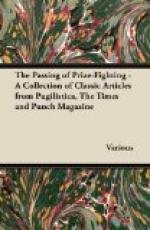“Mr. Punch, I believe!” said some one, approaching the Great Representative. The speaker was a person who wore a garb peculiarly suitable to the autumnal sultriness of the weather. He had about a couple of yards of calico, and one good coating of serviceable paint. The Great Representative bowed his head, and by a gesture, invited further explanation.
“I am connected with the literary world, and am a Colonist. I am known, or used to be known (for I am getting a trifle out of date), as Lord MACAULAY’s New-Zealander.”
Again the Great Representative bowed. He knew his visitor, and bade him welcome. Then he asked him the cause of his visit.
“Well, I really don’t know,” replied the New-Zealander, with a short laugh. “I am afraid I must have been hoaxed. I was told that England was absolutely ruined, and was looking for a comfortable seat amongst the remains of London Bridge.”
“You see you are slightly premature,” returned the Great Representative, pointing towards a more or less majestic pile in the offing. “There was some talk of rebuilding the structure some short while ago, but a viaduct near the Tower was considered preferable. When it is opened, there will be Knighthoods for the Sheriffs, and a Baronetcy for the Lord MAYOR.”
“And yet,” pondered the New-Zealander, “I was certainly informed by wire, that the glory of Britain had vanished for ever.”
“Very likely an Election cry,” observed Mr. Punch, “In the midst of a contested polling, both sides think the success of their rivals must be followed by immediate disaster. But somehow or other, things settle down afterwards, and nothing comes of it. Whichever side wins, the old flag floats in the wind as gaily and as prosperously as ever.”
“And yet I was certainly told that the sun of England had set never to rise again,” persisted the Aboriginal, who seemed to be of an obstinate turn of mind. “Now I remember—the cause was something to do with Diamonds and Henley. Stay, the bright brains of the nation had disappeared. I recollect, the Diamond Sculls of the nation (once so great) had passed to foreigners.”
“Ah, now I take your meaning.” said the National Representative, with a smile, “and you must have heard of the result of the race for the Diamond Sculls at Henley.”
“That must be it,” acquiesced the New-Zealander. “I had forgotten to take into account possible errors in transmission. But tell me, has there been a national defeat?”
“Well, yes,” admitted Mr. Punch, with a sigh—“we did not come out altogether satisfactorily. Even the second man was a Frenchman—albeit, his name was suggestive of dear old Scotland.”
“And do you mean to say,” said the New-Zealander, “that the best scullers of England were beaten by a boating-man from the Seine?”
“It is too true, and the Frenchman himself succumbed to a Dutchman—yes, we confess it, and with shame.”




